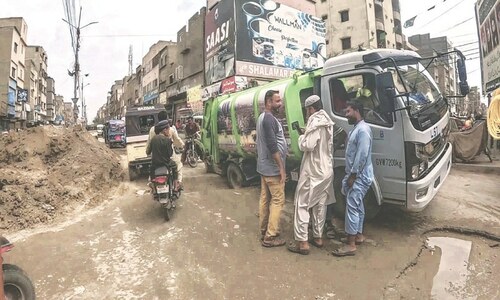KARACHI, Jan 28: Leader of the opposition in the Balochistan Assembly Mir Kachkol Ali has stressed the need for finding a political solution to the problems in that province, warning that the armed conflict could have a detrimental effect on the integrity of the country and the rulers would be held responsible for such a development.
Mir Kachkol, who is also a central leader of the National Party, was talking to newsmen on Saturday at the Karachi Press Club. He was accompanied by the party’s Vice-President, Dr Malik Baloch.
He accused the rulers of adopting a hostile attitude towards Baloch people with a view to “loot and plunder the natural resources, including gas and oil, of the province by using brute force.”
He claimed that thousands of people, including political activists, had been put behind the bars without any formal charge or trial.
He pointed out a delegation of the Human Rights Commission of Pakistan (HRCP), led by Asma Jehangir, had visited the troubled areas of that province and its report verifying human rights violations had also been published.
“It is now the responsibility of the international community and organizations to pressure the government to stop the state repression in Balochistan,” he added.
Presenting a grim picture of the prevailing situation in that province, the NP leader said it was similar to that which had developed just before the 1971 debacle.
He said the government had been making efforts since long to crush the Bugti and Marri tribes in Balochistan whereas the ongoing military action appeared to be the latest move it had resorted to.
According to him, heavy bombardment by military planes had forced much of the Dera Bugti population to flee to mountains or other safe areas.
The Baloch leader said: “The situation is worsening with each passing day while the government appeared bent upon crushing the Baloch civilians.”
However, he added, Baloch people were determined to protect their land and resources, and would not allow the rulers to usurp the same.
When asked whether the resistance could be termed ‘a movement for national liberation’, the NP leader stated that the present crisis could be resolved through dialogue by recognizing the sovereign rights of all federating units and granting them full autonomy to manage their own economic and political affairs. He said that an end to the interference by armed forces in politics was imperative.
Alleging that the armed forces were responsible for the situation where the country had reached on the verge of collapse, he called all democratic forces of the country to force the rulers come to the negotiating table to find a peaceful settlement of the Balochistan issue.
He attributed the current crisis in Balochistan to the federation’s policy of over-centralization of powers thereby weakening the federating units.
Mir Kachkol Ali also criticized the colonial approach of the rulers towards Balochistan, saying that their lust for powers, loot and plunder had created anarchic conditions in the province.
















































Dear visitor, the comments section is undergoing an overhaul and will return soon.